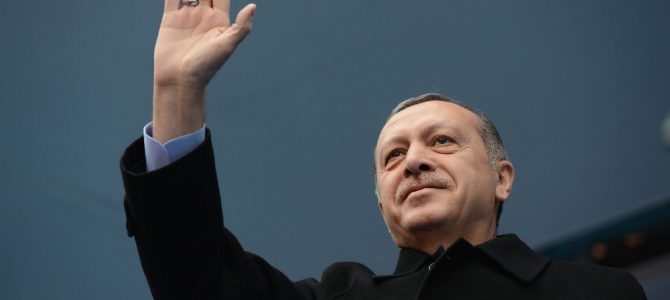Turkey went to the polls yesterday, a full year earlier than the country’s planned national election, to decide whether to extend President Recep Tayyip Erdogan’s hold on power. Erdogan has been president for 15 years, and based on 96 percent of votes that have been counted so far, that term will be extended another five years.
Why did Erdogan hold elections early? For one thing, the Turkish economy is doing well now, a boon to the Erdogan administration that might not last another year. But really, all you need to know about this election is summed up in Erdogan’s campaign motto: “A great Turkey needs a strong leader.”
Many in Turkey (and abroad) see Erdogan as a flourishing authoritarian who is leading Turkey away from the democracy it embraced upon its modern founding after World War I. Since that time, Turkey has also insisted on strict secularism. These twin pillars are what have distinguished Turkey from the rest of the Muslim world over the past century. But democracy and secularism have steadily been eroded under Erdogan.
One of the accelerators of that erosion was the failed coup attempt in the summer of 2016, which gave Erdogan the opportunity to crack down severely on dissent in the military, the universities, the judiciary, and in the press. Nor did he miss the chance to lock up a number of opposition members. Then, last year, Erdogan held a referendum on making constitutional changes that would significantly expand executive powers over parliament and the judiciary. It would also extend how long a president could serve. Erdogan had himself in mind, naturally, which brings us to yesterday’s election.
With Erdogan’s reelection, those expanded presidential powers can now take effect. Of course, Erdogan’s election is being questioned by members of the opposition parties, which all banded together to try to bring him down, to no avail. Not only does the opposition question the election results themselves, but there’s also the small matter of a number of opposition members being imprisoned in the lead-up to the election.
But not everyone in Turkey is lamenting Erdogan’s victory. The budding dictator has a large constituency that makes up about half of the country, which is for most part the country’s conservative Muslim population. These Muslims desire a return to Islamic law in some form. That’s why, ahead of the election, Erdogan began opening religious schools. But he’s not just opening new schools, he’s replacing old schools, changing the curriculum, and firing tens of thousands of teachers and allowing religious groups to take over. This isn’t mere pandering to his constituency. Erdogan himself is an Islamist who wants to raise what he has called “a pious generation.” After yesterday, he will have mostly unfettered powers to transform Turkey in his own image.
All this raises a couple of important questions: First, why did the United States just sell a bunch of F-35s to Turkey in the face of opposition from Congress? The answer to that is that Turkey is a NATO member. Not selling to Ankara would be an affront to a supposed ally. But, as Turkey moves ever further toward authoritarianism and away from democracy, another question inevitably hovers on the horizon: why is Turkey still a member of NATO, and how long can that last?









